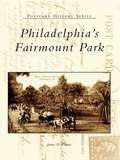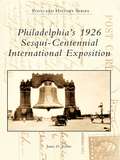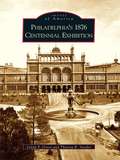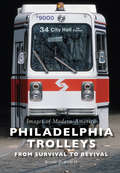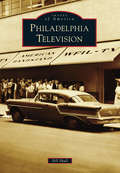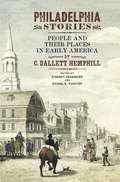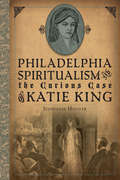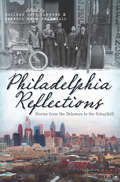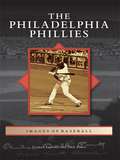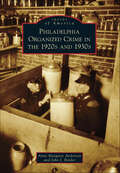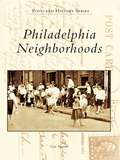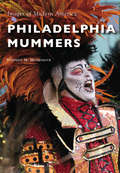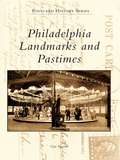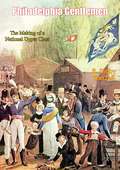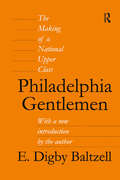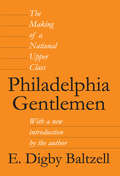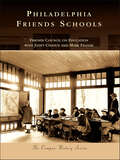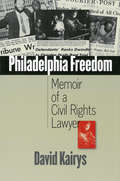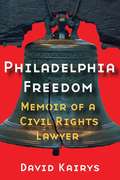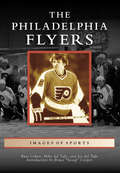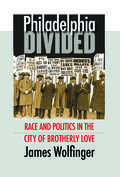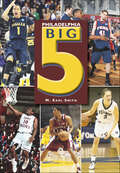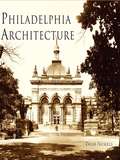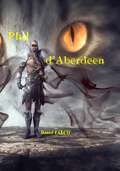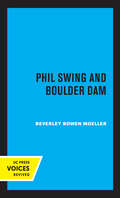- Table View
- List View
Philadelphia's Fairmount Park
by James D. RistinePhiladelphia's Fairmount Park focuses on the more than four thousand acres of land along the east and west banks of the Schuylkill River and into parts of the Wissahickon Valley that comprise one of the world's largest urban parks. Historically and architecturally important structures and buildings are chronicled, such as the famous waterworks, the many bridges that span the park's waterways, the Zoological Gardens, and Boathouse Row. Numerous fountains, monuments, and artistic sculptures that dot the landscape are also documented. Rich in natural beauty, the park's meadows, gardens, lush vegetation, rugged ravines, and wooded areas will capture the eye. Philadelphia's Fairmount Park is a nostalgic view of the park as it was enjoyed by visitors during the first quarter of the twentieth century.
Philadelphia's 1926 Sesqui-Centennial International Exposition
by James D. RistineIn 1926, the city of Philadelphia hosted the Sesqui-Centennial International Exposition to honor the 150th anniversary of American independence. The exposition featured four major exhibition palaces where innovations and advancements in science, technology, education, industry, and agriculture were displayed. An additional fifth palace was dedicated to the fine arts, and foreign nations and individual states erected their own buildings as well. The exposition's theme of patriotism was showcased through the re?created High Street of 1776, a favorite for many. Visitors were also entertained and delighted as they experienced areas known as Treasure Island and the Gladway, where all manner of amusements abounded. Crowds were drawn to the many sporting and cultural events held in the newly built stadium. Even the grounds of the navy yard were opened to the public, allowing citizens views of historic and modern naval vessels and military exhibits. By these offerings, and many others, the Sesqui-Centennial International Exposition celebrated the nation's past, present, and future.
Philadelphia's 1876 Centennial Exhibition
by Linda P. Gross Theresa R. SnyderHeld in Philadelphia from May 10 through October 10, the 1876 Centennial Exhibition celebrated the 100th anniversary of American independence. Philadelphia hosted 37 nations in five main buildings and 250 additional structures on 285 acres of land. The celebration looked backward to commemorate the progress made over the 100-year period, and it announced to the world that American invention and innovation was on a par with that of our foreign counterparts. Patriotism abounded, as did messages of industrial and commercial prowess that promised a brighter future for all. Over nine million people attended this awesome consumer spectacle, an event that set the tone for a long series of world's fairs yet to come.
Philadelphia Trolleys: From Survival to Revival (Images of Modern America)
by Roger Dupuis IIUsing evocative photographs from private collections, Philadelphia Trolleys: From Survival to Revival carries readers on a nostalgic trip through nearly 50 years of transportation history, starting with the takeover of local transit service from the private sector by Southeastern Pennsylvania Transportation Authority (SEPTA). Sporting a rainbow of paint schemes in the 1970s, Philadelphia's fleet of streamlined 1940s trolley cars brought a welcome splash of color to gritty city streets. But more than a coat of paint was needed for America's largest surviving streetcar network, and SEPTA faced tough choices about how much to keep as aging vehicles and infrastructure desperately required renewal or replacement. Long-lived Presidents' Conference Committee (PCC) streamliners were retired, and SEPTA invested in Kawasaki light-rail vehicles, which are still serving Philadelphia commuters 35 years later. Many SEPTA PCC cars found new homes, from Maine to San Francisco--and, more recently, on SEPTA's own revived Girard Avenue line. The story comes full circle as SEPTA officials once again gear up to select a new generation of Philadelphia trolleys.
Philadelphia Television
by Bill ShullThe history of Philadelphia television is the history of television in America. Philo Farnsworth, credited with inventing television, performed some of his earliest experiments at the Franklin Institute and at 1230 Mermaid Lane. Those experiments led to the city's first television station, W3XE. Channel 3 was also the first local station in the country to broadcast in color. WCAU-TV Channel 10 constructed the first building in the world designed specifically as a television station. WFIL created one of the most iconic shows in television history, American Bandstand, as well as Action News, which has helped Channel 6 stay on top of the ratings for most of the last 40 years. Dick Clark, Ed McMahon, Ernie Kovacs, Tom Snyder, David Brenner, Maury Povich, Kelly Ripa, Brian Williams, and others are among those who have worked in Philadelphia television throughout its history.
Philadelphia Stories: People and Their Places in Early America (Early American Studies)
by C. Dallett HemphillFor the average tourist, the history of Philadelphia can be like a leisurely carriage ride through Old City. The Liberty Bell. Independence Hall. Benjamin Franklin. The grooves in the cobblestone are so familiar, one barely notices the ride. Yet there are other paths to travel, and the ride can be bumpy. Beyond the famed founders, other Americans walked the streets of Philadelphia whose lives were, in their own ways, just as emblematic of the promises and perils of the new nation.Philadelphia Stories chronicles twelve of these lives to explore the city's people and places from the colonial era to the years before the Civil War. This collective portrait includes men and women, Black and white Americans, immigrants and native born. If mostly forgotten today, banker Stephen Girard was one of the wealthiest men ever to have lived, and his material legacy can be seen by visiting sites such as Girard College. In a different register, but equally impressive, were the accomplishments of Sarah Thorn Tyndale. In a few short years as a widow she made enough money on her porcelain business to retire to a life as a reformer. Others faced frustration. Take, for example, Grace Growden Galloway. Born to an important family, she saw her home invaded and her property confiscated by patriot forces. Or consider the life of Francis Johnson, a Black bandleader and composer who often performed at the Musical Fund Hall, which still stands today. And yet he was barred from joining its Society. Philadelphia Stories examines their rich lives, as well as those of others who shaped the city's past.Many of the places inhabited by these people survive to this day. In the pages of this book and on the streets of the city, one can visit both the people and places of Philadelphia's rich history.
Philadelphia Spiritualism and the Curious Case of Katie King
by Stephanie HooverIn the wake of the Civil War, Spiritualism--and its promises of communication with the dead--reached its peak as grieving families hoped to reunite with men lost in battle. In the face of an uncertain future, people sought comfort in the messages of mediums, and for Philadelphians, that reassurance was found in Katie King. Katie was a spirit who materialized at the seances of Mr. and Mrs. Nelson Holmes--or so attendees believed. For eight months in 1874, she captivated every level of Philadelphia society, including Vice President Henry Wilson, who clamored to speak with the lovely apparition. When a believer-turned-skeptic decided to investigate Katie King for himself, the "spirit" was quickly revealed as a hoax. From the rise of Spiritualism in the city to the aftermath of the scandal, author Stephanie Hoover reveals the personalities and chicanery behind the curious case of Katie King.
Philadelphia Reflections: Stories from the Delaware to the Schuylkill (American Chronicles)
by Colleen Lutz Clemens Rebecca Helm BeardsallBeyond the iconic landmarks of Independence Hall and the Liberty Bell is the Philadelphia the locals know. The gritty waterfront district, the vital farming suburbs and the immigrant communities of Germantown and Kensington are all part of the hometown face of Philly.From the bustling streets of the downtown of today and yesteryear to the bingo halls of Allentown and the Middletown Grange Fair, this collection takes the reader on a nostalgic journey through the cityscapes and suburbs. Sixteen of Pennsylvania's finest creative nonfiction writers share their stories of taking SEPTA buses, riding the Wanamaker's monorail and kayaking the Schuylkill. This collection of vignettes masterfully reveals the unforgettable histories and colorful traditions that make up the City of Neighborhoods.
Philadelphia Phillies, The (Images of Baseball)
by Seamus Kearney Dick RosenThe Philadelphia Phillies, one of the oldest teams in Major League Baseball, have maintained a strong, loyal fan base for over 125 years. Despite historic set backs, the franchise has proven resilient and evolved into a perennial contender with consistently large attendance figures. In fact, the Phillies claim 37 Hall of Famers, two World Series championships, seven National League pennants, and nine division titles. The Philadelphia Phillies chronicles the greatness of Grover Cleveland Alexander, the remarkable career of Richie Ashburn, the perfection of Jim Bunning, and the teams of success and luster as well as those shining stars of the less successful eras.
Philadelphia Organized Crime in the 1920s and 1930s (Images of America)
by Anne Margaret Anderson John J. BinderPhiladelphia Organized Crime in the 1920s and 1930s explores a little-known but spirited chapter of the Quaker City's history.The hoodlums, hucksters, and racketeers of Prohibition-era Philadelphia sold bootleg booze, peddled illicit drugs, ran numbers, and operated prostitution and insurance rings. Among the fascinating personalities that created and contributed to the Philadelphia crime scene of the 1920s and 1930s were empire builders like Mickey Duffy, known as "Prohibition's Mr. Big," and Max "Boo Boo" Hoff, dubbed the "King of the Bootleggers"; the violent Lanzetti brothers, who ran their own illegal enterprise; mobster Harry "Nig Rosen" Stromberg, a New York transplant; and the arsenic widows poison ring, which specialized in fraud and murder. Bringing to light rare photographs and forgotten characters, the authors chronicle the underworld of Philadelphia in the interwar era. The upheaval caused by the gangs and groups herein mirrors the frenzied cultural and political shifts of the Roaring Twenties and the austere 1930s.
Philadelphia Neighborhoods (Postcard History Series)
by Gus SpectorPhiladelphia Neighborhoods, a compendium of historic views of the major residential sections of Philadelphia, presents a snapshot into the past when old neighborhoods were not so old and when currently established ones were as yet new construction. Through the medium of postcards, readers are invited back to an era before automobiles dominated the streets, before many city roads were paved, and when the local grocery store was not located in a mall. Using chapters divided into subsections that detail the various regions of North, South, Southwest, and West Philadelphia, as well as the "new" Northeast Philadelphia, the author chronicles the vibrant, diverse communities that have helped shape the city's rich history.
Philadelphia Mummers (Images of Modern America)
by Stephen M. HighsmithThe Philadelphia Mummers are costumed individuals and families who celebrate by “strutting” and performing on New Year’s Day. For many, mummery is also a way of life. The first official parade occurred in 1901, but it is an evolving tradition, reflecting both the challenges and opportunities of changing times. Philadelphia Mummers tells the story of modern-day mummery and the expressions of art, freedom, and celebration of thousands of people who come together in the working-class spirit of America’s oldest annual folk parade.
Philadelphia Landmarks and Pastimes (Postcard History)
by Gus SpectorPhiladelphia was a vibrant, exciting city in the first quarter of the 20th century. Tourists and native Philadelphians alike declared their passion for its sports arenas, theaters, movie houses, buildings of historic significance, amusement parks, and the heart-pounding pageantry of its parades and patriotic events. Through antique postcards, Philadelphia Landmarks and Pastimes provides fleeting glances into the city's times past.
Philadelphia Gentlemen: The Making of a National Upper Class
by E. Digby BaltzellAlthough primarily a Proper Philadelphia story that starts with the city's Golden Age at the close of the eighteenth century, this classic study of an American business aristocracy of colonial stock and Protestant (largely Episcopalian) affiliations is also an analysis of how fabulously wealthy, nineteenth-century family founders in Boston, New York, and Philadelphia supported a series of class-creating institutions outside the family. These institutions included: the New England boarding schools; Harvard, Yale, and Princeton; and urban men's clubs and suburban country clubs. They produced, in the course of the twentieth century, a national, intercity, upper-class way of life. Philadelphia Gentlemen shows how this class reached its peak of power and influence in America on the eve of the Second World War.“Writing both as a Philadelphian and a sociologist, Mr, Baltzell has dissected the upper-class structure of his native city with results as fascinating as they are illuminating.”—John Barkham, Saturday Review Syndicate“In constructing a picture of the proper Philadelphian. Baltzell has made use of masses of printed material and some manuscript sources, there is little on Philadelphia and Philadelphia families which he has neglected....a gold mine of information.”—American Historical Review“Philadelphia Gentlemen says important things about class and power in America, and says it in ways that will interest and fascinate; both sociologists and laymen.”—Seymour Martin Lipset“This is a very, very important book.”—The New York Times Book Review
Philadelphia Gentlemen: The Making of a National Upper Class
by E. Digby BaltzellThis is a classic study of Philadelphia’s business aristocracy of colonial stock with Protestant affiliations. It is also an analysis of how fabulously wealthy nineteenth-century family founders produced a national upper-class way of life. But as that way of life came to an end, the upper-class outlived its function; this, argues E. Digby Baltzell, is precisely what took place in the Philadelphia class system. For sociologists, historians, and those concerned with issues of culture and the economy, this is indeed a classic of modern social science.
Philadelphia Gentlemen: The Making of a National Upper Class
by Roger L. GeigerThis proper Philadelphia story starts with the city's golden age at the close of the eighteenth century. It is a classic study of an American business aristocracy of colonial stock with Protestant affiliations as well as an analysis of how fabulously wealthy nineteenth-century family founders in Boston, New York, and Philadelphia, supported various exclusive institutions that in the course of the twentieth century produced a national upper-class way of life. But as that way of life became an end of itself, instead of an effort to consolidate power and control, the upper-class outlived its function; this, argues Baltzell, is precisely what took place in the Philadelphia class system.Philadelphia Gentlemen emphasizes that class is largely a matter of family, whereas an elite is largely a matter of individual achievement. The emphasis in Philadelphia on old classes, in contrast to the emphasis in New York and Boston on individual achievement and elite striving, helps to explain the dramatically different outcomes of ruling class domination in major centers of the Eastern Establishment. In emphasizing class membership or family prestige, the dynamics of industrial and urban life passed by rather than through Philadelphia. As a result in the race for urban preeminence, Philadelphia lost precious time and eventually lost the struggle for ruling preeminence as such.When the book initially appeared, it was hailed by The New York Times as "a very, very important book." Writing in the pages of the American Sociological Review, Seymour Martin Lipset noted that "Philadelphia Gentlemen says important things about class and power in America, and says them in ways that will interest and fascinate both sociologists and laymen." And in the American Historical Review, Baltzell's book was identified simply as "a gold mine of information." In short, for sociologists, historians, and those concerned with issues of culture and
Philadelphia Friends Schools: Friends Council on Education (Campus History)
by Friends Council on EducationWilliam Penn envisioned a society dedicated to religious toleration, participatory government, and liberty. Central to this Holy Experiment was his belief that all children deserved a moral education. In 1689, Penn established a Friends Public School in the commonwealth of Pennsylvania. Over the years, many Quakers have been similarly inspired, and today there are 81 member schools in the Friends Council on Education operating in 22 states. This book includes images from the 10 Friends schools founded in or near Philadelphia before the 20th century: Abington Friends School, Frankford Friends School, Friends� Central School, Friends Select School, George School, Germantown Friends School, Greene Street Friends School, Plymouth Meeting Friends School, William Penn Charter School, and Westtown School. Philadelphia Friends Schools tells the photographic story of an educational philosophy rooted in three centuries of faith and practice.
Philadelphia Freedom: Memoir of a Civil Rights Lawyer
by David Kairys"David Kairys is one of the grand long-distance runners in the struggle for justice in America. His brilliant legal mind and superb lawyerly skills are legendary. This marvelous book is his gift to us!" ---Cornel West, Professor of Religion and African American Studies, Princeton University, and award-winning author of Race Matters Philadelphia Freedom is the spellbinding tale of an idealistic young lawyer coming of age in the political cauldron of the 1960s and 1970s. From his immersion in the civil rights movement to his determined court battles to quell criminal violence by Philadelphia police, Kairys recounts how he helped make history in the city of brotherly love." ---William K. Marimow, Editor and Executive Vice President, Philadelphia Inquirer, and recipient of two Pulitzer Prizes "In the current climate of political deception and the trampling of our civil rights, Kairys's compelling book is a clenched fist, a prayer for social justice and a call to conscience." ---Steve Lopez, Los Angeles Times columnist and former Philadelphia Inquirer columnist "With engaging, insider stories of innovative legal strategies of a truly creative lawyer, this book evokes the ebullient spirit of progressive social change launched in the 1960s and should be read by aspiring and practicing lawyers as well as anyone interested in American social history. Philadelphia Freedom reads like a suspense novel and reveals how novel legal and political thinking can and does make a real difference to individuals and to the quality of justice." ---Martha L. Minow, Jeremiah Smith, Jr. Professor of Law, Harvard University "David Kairys's compelling book properly explains the vital role that civil rights attorneys play in our system of justice." ---Judge John E. Jones III, United States District Court for the Middle District of Pennsylvania, and presiding judge in the landmark Kitzmiller v. Dover Area School District case A memoir that is also a compelling page-turner, Philadelphia Freedom is the poignant, informative, often inspiring account of renowned civil-rights lawyer David Kairys's personal quest for achieving social justice during the turbulent 1960s and 70s. Philadelphia Freedom brings us intimately and directly into Kairys's burgeoning law career and the struggles of the 60s as his professional and private life navigated the turmoil and promise of the civil rights and antiwar movements. Many of the cases Kairys took on involved discrimination and equal protection, freedom of speech, and government malfeasance. Kairys is perhaps most well known for his victory in the Camden 28 draft board case, in which the FBI set up a sting of the Catholic anti-war left at the behest of the highest levels of government. The stories and cases range from nationally important and recognizable---the family of the scientist the CIA unwittingly gave LSD in the 1950s; the leading race discrimination case against the FBI; Dr. Benjamin Spock's First Amendment case before the Supreme Court; the city handgun lawsuits Kairys conceived---to those he encountered in his early work as a public defender. The characters include public figures such as FBI Directors J. Edgar Hoover and Louis Freeh; CIA Director William Colby; Pennsylvania Senator Arlen Specter; New York Attorney General Eliot Spitzer; U.S. Attorneys General Edward Levi and John Mitchell; Georgia Governor Lester Maddox; Pennsylvania Governor, former Philadelphia Mayor, and Democratic National Committee chair Ed Rendell; Philadelphia Mayor and Police Commissioner Frank Rizzo. But some of the most memorable are not well known, involving regular people caught up in the often heartless machinery of the courts and legal system. Though it reads like a novel, with all the elements of character, plot, and suspense, Philadelphia Freedom also has historical significance as a firsthand account of the 1960s and 70s and contains social commentary about race as well as insights and major perspectives on the nature and social role of law. David Kairys is Professor of Law at Beasley School of Law, Temple University. He ...
Philadelphia Freedom
by David Kairys"David Kairys is one of the grand long-distance runners in the struggle for justice in America. His brilliant legal mind and superb lawyerly skills are legendary. This marvelous book is his gift to us!" ---Cornel West, Professor of Religion and African American Studies, Princeton University, and award-winning author of Race Matters Philadelphia Freedom is the spellbinding tale of an idealistic young lawyer coming of age in the political cauldron of the 1960s and 1970s. From his immersion in the civil rights movement to his determined court battles to quell criminal violence by Philadelphia police, Kairys recounts how he helped make history in the city of brotherly love." ---William K. Marimow, Editor and Executive Vice President, Philadelphia Inquirer, and recipient of two Pulitzer Prizes "In the current climate of political deception and the trampling of our civil rights, Kairys's compelling book is a clenched fist, a prayer for social justice and a call to conscience." ---Steve Lopez, Los Angeles Times columnist and former Philadelphia Inquirer columnist "With engaging, insider stories of innovative legal strategies of a truly creative lawyer, this book evokes the ebullient spirit of progressive social change launched in the 1960s and should be read by aspiring and practicing lawyers as well as anyone interested in American social history. Philadelphia Freedom reads like a suspense novel and reveals how novel legal and political thinking can and does make a real difference to individuals and to the quality of justice." ---Martha L. Minow, Jeremiah Smith, Jr. Professor of Law, Harvard University "David Kairys's compelling book properly explains the vital role that civil rights attorneys play in our system of justice." ---Judge John E. Jones III, United States District Court for the Middle District of Pennsylvania, and presiding judge in the landmark Kitzmiller v. Dover Area School District case A memoir that is also a compelling page-turner, Philadelphia Freedom is the poignant, informative, often inspiring account of renowned civil-rights lawyer David Kairys's personal quest for achieving social justice during the turbulent 1960s and 70s. Philadelphia Freedom brings us intimately and directly into Kairys's burgeoning law career and the struggles of the 60s as his professional and private life navigated the turmoil and promise of the civil rights and antiwar movements. Many of the cases Kairys took on involved discrimination and equal protection, freedom of speech, and government malfeasance. Kairys is perhaps most well known for his victory in the Camden 28 draft board case, in which the FBI set up a sting of the Catholic anti-war left at the behest of the highest levels of government. The stories and cases range from nationally important and recognizable---the family of the scientist the CIA unwittingly gave LSD in the 1950s; the leading race discrimination case against the FBI; Dr. Benjamin Spock's First Amendment case before the Supreme Court; the city handgun lawsuits Kairys conceived---to those he encountered in his early work as a public defender. The characters include public figures such as FBI Directors J. Edgar Hoover and Louis Freeh; CIA Director William Colby; Pennsylvania Senator Arlen Specter; New York Attorney General Eliot Spitzer; U.S. Attorneys General Edward Levi and John Mitchell; Georgia Governor Lester Maddox; Pennsylvania Governor, former Philadelphia Mayor, and Democratic National Committee chair Ed Rendell; Philadelphia Mayor and Police Commissioner Frank Rizzo. But some of the most memorable are not well known, involving regular people caught up in the often heartless machinery of the courts and legal system. Though it reads like a novel, with all the elements of character, plot, and suspense, Philadelphia Freedom also has historical significance as a firsthand account of the 1960s and 70s and contains social commentary about race as well as insights and major perspectives on the nature and social role of law. David Kairys is Professor of Law at Beasley School of Law, Temple University. He ...
Philadelphia Flyers, The (Images of Sports)
by Joe Del Tufo Bruce Scoop" Cooper Russ Cohen Mike Del TufoThe Philadelphia Flyers joined the National Hockey League (NHL) in 1967, along with five other teams, to double the league from six to twelve teams. They have enjoyed a lot of success since, including being the first expansion team to win the Stanley Cup. They won back-to-back cups in 1973-1974 and 1974-1975 and would qualify for the Stanley Cup Final six more times. The Flyboys have left their mark on the NHL through their physicality, which helped them garner the nickname "Broad Street Bullies." This book is a pictorial history of the Flyers that examines their modern history and looks back at their legend.
Philadelphia Divided
by James WolfingerIn a detailed study of life and politics in Philadelphia between the 1930s and the 1950s, James Wolfinger demonstrates how racial tensions in working-class neighborhoods and job sites shaped the contours of mid-twentieth-century liberal and conservative politics. As racial divisions fractured the working class, he argues, Republican leaders exploited these racial fissures to reposition their party as the champion of ordinary white citizens besieged by black demands and overwhelmed by liberal government orders.By analyzing Philadelphia's workplaces and neighborhoods, Wolfinger shows the ways in which politics played out on the personal level. People's experiences in their jobs and homes, he argues, fundamentally shaped how they thought about the crucial political issues of the day, including the New Deal and its relationship to the American people, the meaning of World War II in a country with an imperfect democracy, and the growth of the suburbs in the 1950s. As Wolfinger demonstrates, internal fractures in New Deal liberalism, the roots of modern conservatism, and the politics of race were all deeply intertwined. Their interplay highlights how the Republican Party reinvented itself in the mid-twentieth century by using race-based politics to destroy the Democrats' fledgling multiracial alliance while simultaneously building a coalition of its own.
Philadelphia Big 5
by M. Earl SmithIn the "City of Brotherly Love," there are few things taken as seriously as local bragging rights. In a city that lives and dies with its sports heroes, basketball is no exception. This volume traces the lore and history behind Philadelphia's Big 5, an informal basketball league that features five of the area's most prestigious colleges: LaSalle University, Temple University, Saint Joseph's University, Villanova University, and the University of Pennsylvania. Formed in 1955, the Big 5 pulls teams from the Ivy League, the Big East, the American Athletic Conference, and, in the case of both LaSalle and Saint Joseph's, the Atlantic 10. With a round-robin format, each team plays the other once and best record takes home the trophy. In a sport that has become a nationwide sensation, the spirit of Philadelphia lives on, led by the most loyal and passionate fans in the world.
Philadelphia Architecture
by Thom NickelsPhiladelphia is a city of Colonial and ghostly architecture with narrow historic streets that open up onto vistas of bold, towering skyscrapers. It is a city of Greek Revival banks, Italian Renaissance, and Second Empire buildings, a city of Beaux-Arts hotels, Byzantine and Gothic churches, and International-style high-rises. A hybrid of gritty Chicago and pristine Boston, Philadelphia stands alone, an aristocrat in bib overalls, as a livable, intimate city of neighborhoods and luxurious townhouses, of hidden treasures and spectacular surprises. Philadelphia Architecture, a walk through Philadelphia streets past and present, highlights the richness and diversity of the city's architectural history.
Phil d'Aberdeen: A play in Anglo-Saxon sauce ...
by Daniel FalcoPhil d'Aberdeen by Daniel Falco A play in Anglo-Saxon sauce ... Phil d'aberdeen Phil the Scotsman, Phil the English, Phil the hero. Three different features for the same man who embodies the fundamental values of human life, seen as the only possibility of expressing himself in small and large enterprises, in hatred and love, in truth and falsehood, in courage and fear. Daniel Falco's theater comes to life, it dialogues with the actors, with the characters, with the scenes. And it does so through a curtain.
Phil Swing and Boulder Dam
by Beverley Bowen MoellerThis title is part of UC Press's Voices Revived program, which commemorates University of California Press’s mission to seek out and cultivate the brightest minds and give them voice, reach, and impact. Drawing on a backlist dating to 1893, Voices Revived makes high-quality, peer-reviewed scholarship accessible once again using print-on-demand technology. This title was originally published in 1971.
